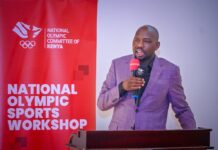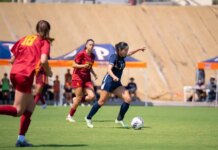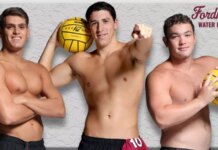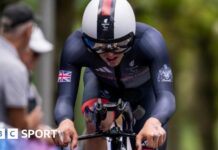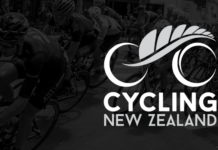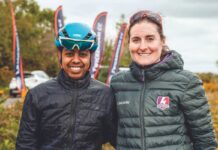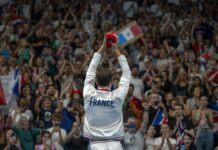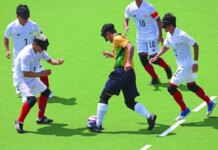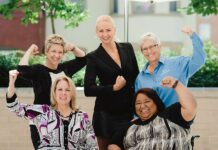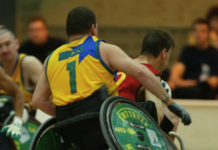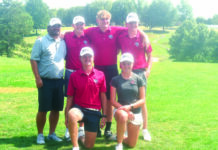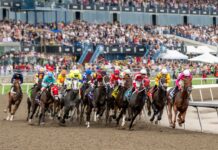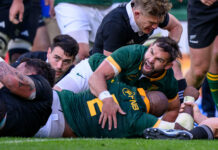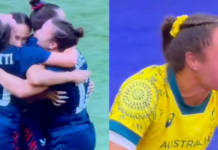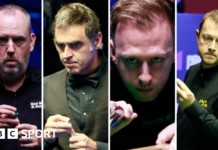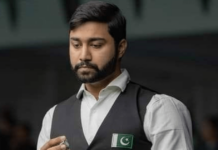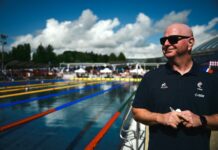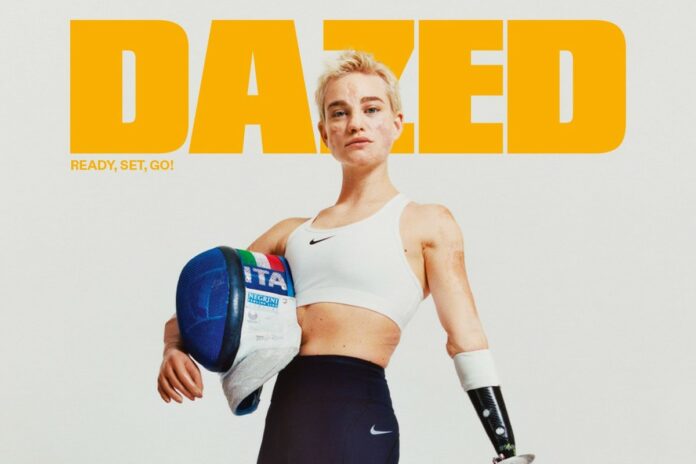At the age of 11, Bebe Vio’s dreams of Olympic fencing glory were shattered by a life-threatening bout of meningitis. Now, 64 medals and 27 broken prostheses later, she’s an unstoppable force in athletics
Taken from the summer 2024 issue of Dazed. You can buy a copy of our latest issue here.
Call time is set at 10.30am. Despite Rome’s legendary traffic, at 10.30 sharp Bebe Vio enters. She’s the kind of person who smiles with her eyes – huge, deep blue eyes. She’s got a ‘Come on, let’s do it!’ attitude that permeates the room. “Just make sure you don’t cover the scars” is her only recommendation on set for the shoot. “So many clothes. If it was up to me, I’d be happy with a tank top and leggings.” The glamour of fashion doesn’t concern her, yet she won’t stop until the job’s done. From one shot to the next, it’s hard to keep up with her rhythm.
Vio fell in love with fencing as a kid; by the age of five she was already dreaming of the Olympics. Then she contracted severe meningitis. She miraculously survived, but doctors had to amputate her legs at the knee and both of her forearms. It was 2008; she was 11. You would think, this is it. Instead, she was like, “Well, I can’t dream of the Olympics any more, but I can dream of the Paralympics.” And so her story began.
Vio has got such a joyful vibe, you almost wonder if it’s real – but five minutes in the Paralympic champion athlete’s company is enough to know she would never do or say a single thing that isn’t her authentic self. You cannot make Bebe Vio do anything she doesn’t want to do and, more importantly, you can’t keep Vio from doing anything she wants to do. At the end of the day, she’s still that kid who, when told it would be impossible to get a selfie with Barack Obama, simply replied, “Sorry, Mr President, I don’t know the meaning of that word,” and got him to take the shot. At the 2012 London Paralympics, despite being too young to compete, she was chosen as a torchbearer after more than 1,000 people signed a petition to the International Paralympic Committee to support her candidacy. Italy’s girl prodigy kept giving security a hard time as she tried to run, despite being told to walk. Now, 64 medals – including golds from the 2016 and 2020 Paralympics – and 27 broken prostheses later, Vio is probably one of the greatest wheelchair fencers we have ever seen.
Vio’s achievements don’t end there. Through her non-profit art4sport and the Bebe Vio Academy – an inclusive programme supported by Nike that focuses on making sport accessible to all – she’s been working tirelessly to promote the practice of Paralympic sport. Thanks to her popularity, she is actually influencing the culture around disability, reshaping the mentality around the subject. As we speak, I notice Vio doesn’t really use the pronoun ‘I’; everything is a ‘We’. Vio is all about getting there together.
Bebe wears viscose and silk dress ALAÏA, modal and elastane bodysuit and nylon
leggings worn underneath NIKE.Photography Soléne Gün, Styling Andra-Amelia BuhaiBebe wears nylon zip top NIKEPhotography Soléne Gün, Styling Andra-Amelia Buhai
It seems like life is pretty hectic for you right now. You must be exhausted.
Bebe Vio: Yes, but it’s standard pre-Olympics routine. We took care of all comms and, from now on, it’s just training, training, training.
What’s it gonna be like from now on?
Bebe Vio: Now is the time to push! Then the workload will slowly decrease. We will be training a lot with the whole team: coach, trainer, doctor, physio – everyone has to be on the same page about how to get to the Paralympics. As athletes, we need to trust people around us.
I saw you just had the FlytoParis retreat, which sounded like fun. If I’m getting it right, it’s a team of young athletes with disabilities working together to achieve their goal of qualifying for the Paralympics, from an original idea by your mum, Teresa. How did the project come to life?
Bebe Vio: FlytoParis is coming out super cool! Before Tokyo 2020, we started to challenge ourselves on who would make it to the qualifications. My mom saw something in this and made it into a concrete project. You know, not all the federations provide athletes with the necessary sta!. We are lucky to have trainers, doctors and physios but this is not the case for all sports. So I said, ‘OK, let’s make it an equal basis for everyone,’ and we gathered all these professionals together. For Tokyo we were 11 athletes – seven of us qualified, bringing home five Olympic medals.
That’s a crazy good result. This ‘let’s do it together’ approach is very original.
Bebe Vio: Qualification is important but there’s also beauty in experiencing the journey together, living the team and cheering [for] each other. In Paris, regardless of qualifications, we will all be staying together in the same house, cheering and following our mates’ competitions. Normally, we would just compete and leave. This is a unique way of experiencing it. This year is also a double challenge…
“Fifteen per cent of the world’s population has a disability; if you put us all together we’d make a big country as big as China. You shouldn’t be interviewing me but them!”– Bebe Vio
What do you mean?
Bebe Vio: We are paired in couples and we are given the opportunity to acquire points, not only based on our results in the competitions towards qualification but also for things like the maths test at school, exams, volunteering and participation in art4sport’s events. When the Paralympics is over, we’ll have a chart.
A challenge within a challenge. Like the Olympics aren’t enough! It must be quite funny and stimulating, especially for younger athletes. It’s important to show that, when you have an objective, there are many different ways to get there that not only make you a better athlete but a better human.
Bebe Vio: Indeed, what we are trying to say is, yes, sport is super important, but there’s so much more. Education, volunteering, events – there’s a whole world around the athlete that doesn’t end with just the tournament.
I think the reason young people love you so much is this kind of explosive positivity. You show them that they have to see the glass half full.
Bebe Vio: Nowadays, it feels weird to see a happy person on social media. It’s almost a trend to take selfies while crying, like being sad makes us more real. Personally, I believe that if there is a problem, the best thing is to immediately laugh about it. You know, it’s not despite everything but with everything that happens, at least let’s find the positive side! At the end of the day, bad luck comes from all sides, it gets us anytime. I say let’s see the good in it. It’s important to find a purpose that makes us get up in the morning.
You definitely found purpose. You’ve become a pioneer in your effort to change the mentality around disabilities and promote inclusivity.
Bebe Vio: Integration is necessary to change the way disabled people are perceived. An interview with a disabled person doesn’t necessarily have to begin with, ‘After everything you’ve been through, do you feel like sports gave you the strength to keep on going?’ In our culture, we are used to thinking we have to hide our kids or not get them into sports to avoid showing the wheelchair. These kinds of prejudices have hampered integration.
Bebe wears cotton top DURAN LANTINK.Photography Soléne Gün, Styling Andra-Amelia BuhaiAll clothes NIKEPhotography Soléne Gün, Styling Andra-Amelia Buhai
At least we are starting to see some improvements.
Bebe Vio: True. Once, a person with disability would just be ‘having fun’ doing sports, today we are recognised as Paralympic athletes.
What’s the main obstacle you’ve experienced in the interaction with others?
Bebe Vio: Fear. The fear of the unknown, but especially the fear of asking questions. Fear prevents people from progressing culturally. When we are curious about something we don’t know and start asking questions, that particular thing that is so strange at the beginning will eventually feel like normality. If I stay far away from it, the thing I am looking at would seem weird, fragile – I wouldn’t know how to act around it. Just get closer, get familiar, without prejudice, and you’ll get rid of all the taboos. We Italians are lucky because when we fall in love, it’s over. We get over-enthusiastic and won’t let go for anything in the world. If there’s something to say, we say it. If there’s a question…
We ask. Do you remember the first feeling when you realised life had changed forever?
Bebe Vio: The urge of getting back on it. In the sports world, we are used to living in the gym with objectives. Yes, I did lose some time, but that’s where I came from and the only important thing was getting back to it. Sure, I didn’t do it alone. I had the support of my family, my friends and the people who pushed through it with me, who wanted to get to know this new world with me.
The willpower you’re talking about is remarkable, especially considering that you were only 11. It seems like you had quite a grown-up way of seeing things.
Bebe Vio: Actually, it’s the opposite. Kids don’t worry too much; adults overthink. Kids don’t know depression or have doubts, they don’t give a shit about pain. The only important thing is going back to play. If they break a leg, they don’t ask the doctor if it’s safe, they drag their leg back to the game. I was lucky to have it at a young age because I didn’t ask myself too many questions; it was the grown-ups who were like, “You can’t do this any more.”
“Fear of the unknown prevents people from progressing culturally… Just get closer, get familiar, without prejudice, and you’ll get rid of the taboos” – Bebe Vio
Tell me one time you’ve been told, ‘Bebe, seriously, this is not possible’ and then you found a way?
Bebe Vio: Many things in the beginning, including fencing. ‘It’s done with hands. You don’t have them, just let it go,’ they said. Then my dad was like, ‘OK, let’s find a solution. What do you need? Prosthetics. Do they exist? No. Great, let’s create them.’
Your dad designing a prosthetic so that you could continue with fencing is my favourite story. I would love to spend a Sunday with the Vio family.
Bebe Vio: The perfect Sunday is lunch by the sea with some amazing spaghetti with bottarga and prosecco.
Amen. What are we listening to on the road?
Bebe Vio: My taste in music is infamously terrible. The only one I get approval on is Jovanotti.
This doesn’t surprise me, he’s another national master of joie de vivre. Maybe the hunger for life runs in the genes! I guess this resilience is a family matter…
Bebe Vio: Yes, absolutely. I was lucky to have two parents with – I’m not sure you can write this – but big balls who work to make other people’s life better. My dad just sits there and invents weird things; he builds stu! with whatever is available. We have a magic wooden house in the garden.
Your dad is the best.
Bebe Vio: He’s always been the kind of guy who makes what is needed, from the little house we have for the turtles – my mom is obsessed with them – to prostheses. You know, it’s 45 of us at the art4sport. Every day we need to invent a new piece: a hand for horse riding, a prosthesis to use the snowboard, one to swim… Kids come to me and say, ‘I want to do this’ and it’s up to us to find a solution. At the Bebe Academy, for instance, we had this kid in a wheelchair, paraplegic, coming in and saying, ‘I want to play football.’ We suggested other sports but he was very firm. He just said, ‘Put me down on the ground.’ We were all concerned, scared he would get hurt. Minutes later he was playing with the other kids. The beauty of children is they don’t wait around for you to explain to them how to play together, they will find a way. The Bebe Academy is amazing because there is a special bond developing between disabled and not-disabled kids. Now, we have the first team of disabled and not-disabled children playing football together on the ground.
All clothes NIKE × JACQUEMUS, V2K mesh and rubber trainers NIKE.Photography Soléne Gün, Styling Andra-Amelia BuhaiAll clothes NIKE × JACQUEMUS, V2K mesh and rubber trainers NIKEPhotography Soléne Gün, Styling Andra-Amelia Buhai
Which is the ultimate goal, isn’t it? With this and also with charity events like WEmbrace, where Olympic and Paralympic champions compete together and against each other, you’ve proved that coexisting is possible.
Bebe Vio: Exactly. We don’t care about sex, religion or ethnicity, we embrace everything that is seen as di!erent to make it normal. The goal is to normalise. It is wrong to think about people with disabilities as superheroes whenever they do common things. That sort of mentality makes you think, ‘Oh, they are so good at being able to do it without their arms!’ For instance, people who need glasses, once they put them on, does it make them superheroes? No. They just need an accessory. The goal is, in eight years’ time, to get into a random gym in Italy, let’s start slow, and be able to witness children with legs, without legs, in wheelchairs, standing on their feet, blind, all playing sports together like it’s business as usual.
Did you ever feel like you’ve been given a mission? Like everything happened for a reason?
Bebe Vio: Let’s make one thing clear: I would have never have wished for my family to go through the pain they went through, for anything in the world. I wouldn’t wish it on my worst enemy. I am happy now, my life is great, but I would have been great even with all four pieces there! But things happen, and we can’t get depressed thinking that life is over. It turned out well for me so I try to do something meaningful with what has happened. You know, as a kid I was part of the children’s town council, a group of kids working for the town hall. I was in the group for the safety of the citizens. Already then, before being disabled, I used to give ‘friendly’ tickets to whoever was occupying the disabled parking spots. You see, I already used to give a hard time to people then!
I guess we would have seen you giving a speech at [Italian seat of government] the Chamber of Deputies anyhow.
Bebe Vio: [Laughs] I don’t know, but we don’t have to wait to be personally concerned to care about something. Many of our volunteers do not have disabilities or disabled relatives or friends. We call them ‘disabled by choice’, for passion. They simply want the best for others. If I have a mission, they have it too.
Are there any new Bebe Vios out there we should be paying attention to?
Bebe Vio: Yes! Luca Pancalli, president of the Italian Paralympic committee, once said to me, ‘I have a billion athletes like you, the problem is they only ask about you or [paracyclist Alex] Zanardi.’ One of the purposes of these projects is to give visibility to people who have incredible stories, work as hard and do many great things. In fact, the FlytoParis project will also become a Netflix series to tell these powerful stories. Fifteen per cent of the world’s population has a disability; if you put us all together we’d make a big country as big as China. You shouldn’t be interviewing me but them!
“The Bebe Academy is amazing because there is a special bond developing between disabled and not-disabled kids. Now, we have the first team of disabled and not-disabled children playing football together on the ground” – Bebe Vio
We will get there! In the meantime, I am glad we are able tell your story. I love that you’re the kind of person who would go to the White House, meet Barack Obama and tell him he’s got a cool place there. I think that we’re here not only because you’re a great athlete but because you set a great example.
Bebe Vio: I was the first one to get great examples, especially at home. When you’ve got parents raising you the way they raised me, it’s much easier to keep going, plus a young fencer in Italy can’t help but have big ideals. We grew up with [Valentina] Vezzali and many athletes who made history and inspired me not only in fencing but in life.
Sport gives you a certain mentality.
Bebe Vio: It teaches you to respect rules and people, problemsolving, hard work, teamwork and to dream. Sport is good because it makes you a better person. We have to realise that behind the athletes there’s the work of many people. It’s not because of us but thanks to the whole group if we get to that last score.
I also think there’s a playful aspect to it.
Bebe Vio: We live together with our teammates, like a family. We move to di!erent cities to train together but also to be able to share daily life. Being a team means knowing your mate well enough to know exactly what to say or not to say, what can bring them that joy or sporting rage which might be needed in certain situations. Retreats, journeys and holidays are all essential.
To the younger generations, you often explain how important commitment and dedication are in turning dreams into objectives. Do you still have some dreams waiting to be fulfilled?
Bebe Vio: So many! That’s my problem, as soon as I think about something I immediately make a list of the things I need to do to make it happen. I have serious problems with lists. I still keep some dreams silent while I focus on these objectives, but the time will come for all of them.
We’re standing by. Ad maiora, Bebe.
Hair GIULIO ORDONSELLI at STUDIO REPOSSI, make-up SAMIA MOHSEIN at MAKING BEAUTY MANAGEMENT using CHANEL BEAUTY, set design VICTORIA SALOMONI at THE MAGNET AGENCY, prop styling VITTORIO MANGO, UNDER THE INFLUENCE: THE GALLERY, photographic assistants CARMEN WORETH, JÉRÉMY CARDOSO, styling assistants LEA ZÖLLER, FLAVIA FIGÀ TALAMANCA, tailoring LUCIA SIGNORI, set design assistants ELONORA IACOBUCCI, SAMUEL AMODEO, armchair design GAETANO PESCE courtesy of MERITALIA, production MAI PRODUCTIONS, hand printing NATALIE HAIL, post-production HAND OF GOD, special thanks WE GIL ROMA
Source link : https://www.dazeddigital.com/life-culture/article/62740/1/bebe-vio-interview-profile-fencing-paralympics-2024-disability-sports?amp=1
Author :
Publish date : 2024-06-04 07:00:00
Copyright for syndicated content belongs to the linked Source.



